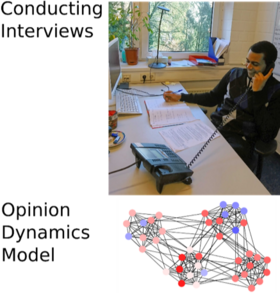How do cognitive biases affect our perception of sea level rise?
by the SEATRAC project.
Global environmental changes, such as sea level rise, pose threats and risks that humans must recognise and ultimately adapt to. Yet, humans are prone to cognitive biases, which limit our ability to deal rationally with such problems. This has serious consequences on our ability to recognise the problems and adapt to them.
The current Covid-19 pandemic is a good example of how a global threat can be perceived differently by individuals. Such differences in perception influence the way we react and adapt to such global threats. Former U.S President Donald Trump believed that the virus would magically “disappear”. Was Trump subject to the positive illusion bias? Ultimately, different perceptions may lead to diverging opinions and, in some cases, even to polarisation, which dampens efforts to effectively respond to the threat, such as establishing a comprehensive mask policy.
Similar to Covid-19, sea level rise imposes a threat to society, which has been extensively communicated by experts. Although differences exist between the two threats, cognitive biases have an influence on both in the way we perceive and react to them. The overall goal of our project is to investigate how major biases impact the recognition of and adaptation to sea level rise, from a cross-cultural perspective.
To achieve this goal, we plan to gain a better understanding of 1) how people perceive sea level rise in general (and what possible cognitive biases they may have towards this threat), 2) the information sources people generally use, and 3) the place-specific adaptation options available, including the adaptations people have already undertaken (e.g. household adaptations). We conducted non-standardised interviews with different stakeholders (e.g. government, industry/business sector, etc.) and households to assess diverse perspectives ranging from opinion-leaders to the ordinary person. Originally, we planned to conduct the interviews in person.
However, due to Covid-related travel restrictions, we adopted telephone and video calls. The insights gained thus far prove useful for the next phase of the project, which is to quantify the relative importance of different cognitive biases in explaining adaptive behaviours.
Additionally, we are developing a dynamic opinion model with the aim of capturing the influence of cognitive biases on opinion formation. Over the years, the study of opinion formation has acquired a multidisciplinary character. `Sociophysics' is an attempt to use analogies from physics to investigate how societal phenomena like opinion clustering or polarisation emerge in a society. Similarly to the way some metals magnetise (i.e. the magnetic moments of the single atoms line up parallel to each other) along the direction of a magnetic field, the opinions of individuals in the model may align towards a common view following social interactions or media influence. Our model is based on a simple assumption: individuals are fully rational in the way they form an opinion about sea level rise; however, cognitive biases influence the way individuals perceive information about it. Under which conditions do these processes lead to a fragmented or even polarised society? How can we overcome the limits imposed by cognitive biases? These are questions at the base of our investigations.

